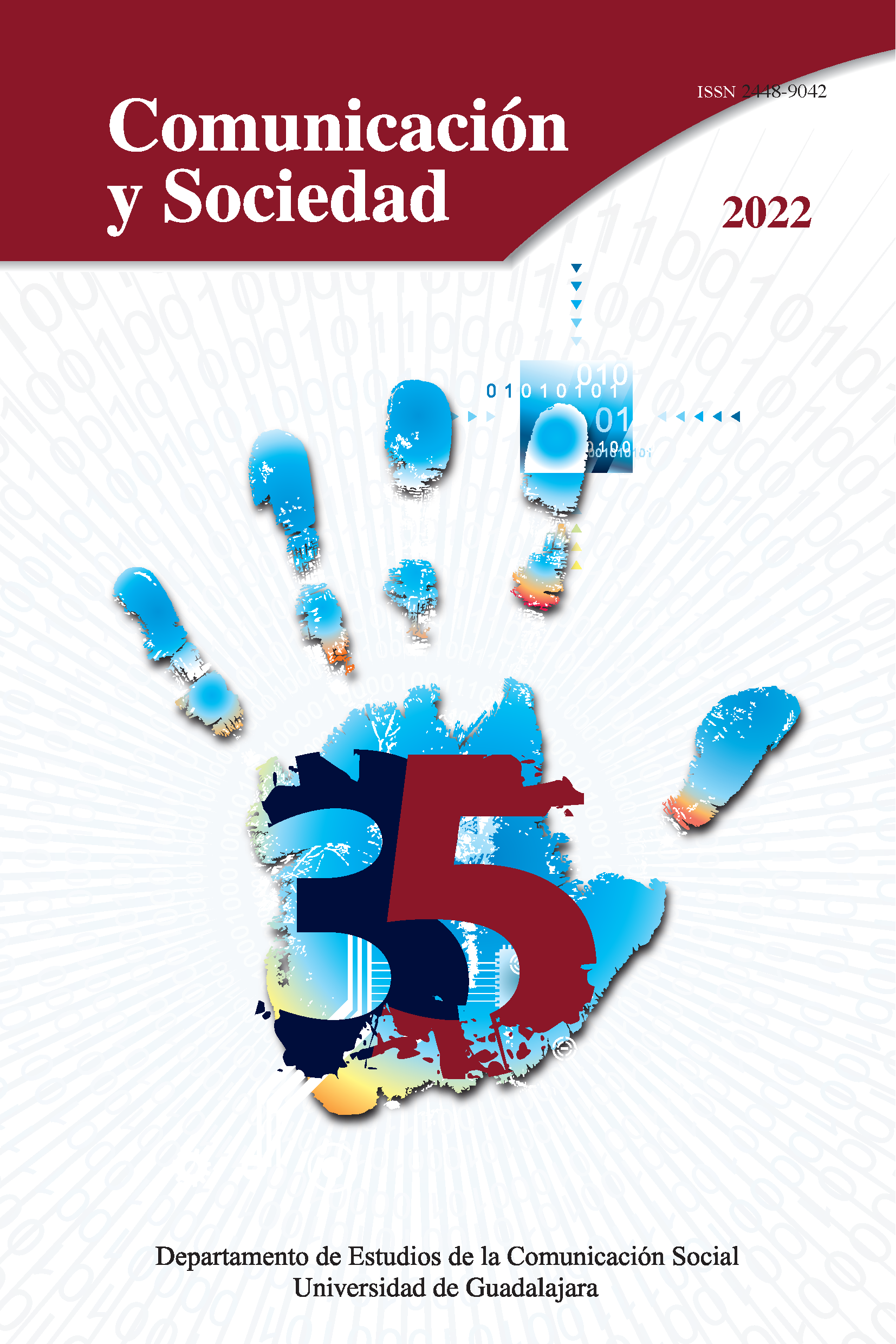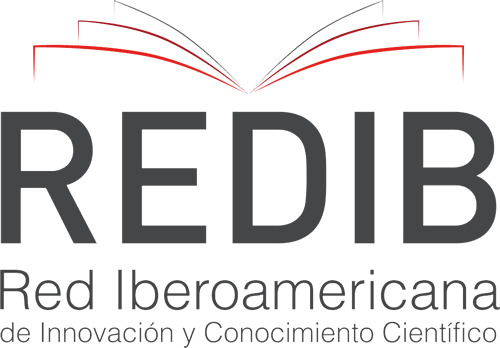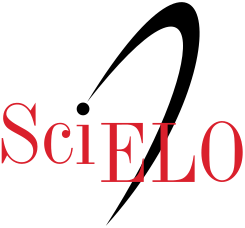Comparación entre la cobertura de la prensa a campañas presidenciales y la agenda de los periodistas que conducen debates
DOI:
https://doi.org/10.32870/cys.v2022.8177Palabras clave:
Debates electorales, Agenda periodística, Personalización, Cobertura estratégica, Campañas presidencialesResumen
La cobertura de campañas tendería a preferir temas de juego estratégico y personalización sobre propuestas de políticas públicas. En cambio, se espera que los debates electorales en televisión sean un momento diferenciador de la rutina periodística. Mediante un análisis de contenido, se compara la agenda de los periodistas en cuatro debates presidenciales chilenos con la de la prensa escrita en la cobertura de las respectivas campañas. Los resultados muestran que los periodistas en los debates se concentran en las políticas públicas, mientras que la prensa lo hace en las estrategias o en temas políticos.Descargas
Citas
Adam, S. & Maier, M. (2010). Personalization of Politics. A Critical Review and Agenda for Research. Communication Yearbook, 34, 213-258. https://doi.org/10.1080/23808985.2010.11679101
Anguita Ramírez, P. & Labrador Blanes, M. J. (2019). Pluralismo y libre Competencia en el mercado de la televisión y radiodifusión: el caso chileno. Revista de Comunicación, 18(1), 11-32. http://dx.doi.org/10.26441/RC18.1-2019-A1
Bastien, F. (2020). Using parallel content analysis to measure mediatization of politics: The televised leaders’ debates in Canada, 1968-2008. Journalism, 21(11), 1743-1761. https://doi.org/10.1177/1464884917751962
Ben-Porath, E. N. (2007). Question Bias and Violations of Comparability in Intraparty Debates: Iowa and New Hampshire, 2004. Communication Quarterly, 55(4), 375-396. https://doi.org/10.1080/01463370701655974
Cappella, J. N. & Jamieson, K. H. (1996). News Frames, Political Cynicism, and Media Cynicism. The Annals of the American Academy of Political and Social Science, 546, 71-84. https://doi.org/10.1177/0002716296546001007
Coleman, S. (2000). Meaningful political debate in the age of the soundbite. En S. Coleman (Ed.), Televised election debates. International perspectives (pp. 1-24). MacMillan Press.
Coleman, S. & Moss, G. (2016). Rethinking Election Debates: What Citizens Are Entitled to Expect. The International Journal of Press/Politics, 21(1), 3-24. https://doi.org/10.1177/1940161215609732
de Vreese, C. (2005) News framing: theory and typology. Information Design Journal, 1(1), 51-62. https://doi.org/10.1075/idjdd.13.1.06vre
de Vreese, C., Esser, F. & Hopmann, D. V. (2017). Comparing Political Journalism. Routledge.
Eveland, W. P., McLeod, D. M. & Nathanson, A. (1994). Reporters vs. undecided voters: An analysis of the questions asked during the 1992 presidential debates. Communication Quarterly, 42(4), 390-406. https://doi.org/10.1080/01463379409369945
Echeverría, M. (2017). Infoentretenimiento periodístico en la cobertura de las elecciones. El caso de los debates presidenciales. Convergencia, 24(74), 113-136. https://doi.org/10.29101/crcs.v0i74.4384
Echeverría, M. (2019). La lógica mediática contra la deliberación mediada. El caso de los debates presidenciales. Cuadernos.Info, 45, 57-72. https://doi.org/10.7764/cdi.45.1573
Echeverría, M. & González, R. A. (2018). Lógica mediática y comercialismo periodístico. Un análisis longitudinal de encuadres en la cobertura electoral. Communication & Society, 31(1), 57-71. https://hdl.handle.net/10171/54619
Gerth, M., Rademacher, P., Pühringer, K., Dahinden, U. & Siegert, G. (2009). Challenges to Political Campaigns in the Media: Commercialization, Framing, and Personalization. Studies in Communication Sciences, 9(1), 149-170. https://doi.org/10.5167/uzh-20005
Godoy, S. (2000). ¿Públicamente Rentable? Evaluación de la TV pública chilena orientada al mercado. Ediciones UC.
Gronemeyer, M. E. & Porath, W. (2017). Tendencias de la posición editoriales en diarios de referencias en Chile: el arte de dosificar la crítica frente a la actualidad de los actores políticos. Revista de Ciencia Política, 37(1), 177-202. https://doi.org/10.4067/S0718-090X2017000100008
Hilsenrad, M. (2020). Chile: Presidential Debates, From Dictatorship to Democracy. En J. Juárez-Gámiz, C. Holtz-Bacha & A. Schroeder (Eds.), Routledge International Handbook on Electoral Debates (pp. 83-91). Routledge.
Jandura, O. & Friedrich, K. (2014). The quality of political media coverage. En C. Reinemann (Ed.), Handbook of Communication Science: Political Communication (pp. 351-373). De Gruyter Mouton.
Jennings, F. J., Warner, B. R., McKinney, M. S., Kearney, C. C., Funk, M. E. & Bramlett, J. C. (2020). Learning from Presidential Debates: Who Learns the Most and Why? Communication Studies, 71(5), 896-910. https://doi.org/10.1080/10510974.2020.1807377
Juárez-Gámiz, J., Holtz-Bacha, C. & Schroeder, A. (2020). Introduction: Image, Deliberation, and Symbolic Power – Why Do Electoral Debates Matter? En J. Juárez-Gámiz, C. Holtz-Bacha & A. Schroeder (Eds.), Routledge International Handbook on Electoral Debates (pp. 1-4). Routledge.
León-Porath, V., Ramdohr, T. & Suzuki, J. J. (2015). Tres formas de personalización en la cobertura de la prensa chilena a las campañas presidenciales. Trípodos, 37, 113-132. http://www.tripodos.com/index.php/Facultat_Comunicacio_Blanquerna/article/view/254
Lucaites, J. L. (1989). Rhetorical legitimacy, (public trust) and the Presidential debates. The Journal of the American Forensic Association, 25(4), 231-238. https://doi.org/10.1080/00028533.1989.11951404
Magin, M. (2019). Attention, please! Structural influences on tabloidization of campaign coverage in German and Austrian elite newspapers (1949-2009). Journalism, 20(12), 1704-1724. https://doi.org/10.1177/1464884917707843
Marien, S., Goovaerts, I. & Elstub, S. (2020). Deliberative qualities in televised election debates: the influence of the electoral system and populism. West European Politics, 43(6), 1262-1284. https://doi.org/10.1080/01402382.2019.1651139
Marín Lladó, C. & Pérez Tornero, J. M. (2020). Un modelo conceptual para analizar los debates electorales en TV. Mediatización y ceremonias televisivas. Revista Latina de Comunicación Social, (76), 229-245. https://doi.org/10.4185/RLCS-2020-1445
McKinney, M. S. & Warner, B. R. (2013). Do presidential debates matter? Examining a decade of campaign debate effects. Argumentation and Advocacy, 49(4), 238-258. https://doi.org/10.1080/00028533.2013.11821800
Montez, D. J. & Brubaker, P. J. (2019). Making debating great again: US Presidential candidates’ use of aggressive communication for winning presidential debates. Argumentation and Advocacy, 55(4), 282-302. https://doi.org/10.1080/10511431.2019.1672033
Mujica, M. & Bachmann, I. (2013). Melodramatic Profiles of Chilean Newscasts: The Case of Emotionalization. International Journal of Communication, 7, 1-20. https://ijoc.org/index.php/ijoc/article/viewFile/2177/971
Muñiz, C. (2014). La política como debate temático o estratégico. Framing de la campaña electoral mexicana de 2012 en la prensa digital. Comunicación y Sociedad, (23), 67-95. https://doi.org/10.32870/cys.v0i23.64
Navia, P. & Osorio, R. (2015). El Mercurio Lies, and La Tercera Lies More. Political Bias in Newspaper Headlines in Chile, 1994-2010. Bulletin of Latin American Research, 34(4), 467-485. https://doi.org/10.1111/blar.12364
Nguyen, V. A., Boyd-Graber, J., Resnik, P., Cai, D. A., Midberry, J. E. & Wang, Y. (2014). Modeling topic control to detect influence in conversations using nonparametric topic models. Machine Learning, 95(3), 381-421. https://doi.org/10.1007/s10994-013-5417 9
Núñez-Mussa, E. (2018). Variación y distribución de los roles periodísticos en los debates presidenciales televisados de Chile en 2005 y 2013. Memorias XIV Congreso de la Asociación Latinoamericana de Investigadores de la Comunicación. Grupo Temático 16: Estudios sobre Periodismo (pp. 198-204). https://bit.ly/2DDIlMw
Olson, K. (2013). Framing silence and absence regarding presidential debates: successful and unsuccessful performances of leadership. Argumentation and Advocay, 49, 167-194. https://doi.org/10.1080/00028533.2013.11821791
Patten, P. & Johnson, T. (2020, 29 de septiembre). Presidential Debate #1 Review: Donald Trump Rants, Joe Biden Plays POTUS & Chris Wallace Loses Control. Deadline. https://bit.ly/3K2gPFB
Patterson, T. E. (1977). The 1976 horserace. The Wilson Quarterly, 1(3), 73-79. https://archive.wilsonquarterly.com/essays/1976-horserace
Patterson, T. E. (1994). Out of Order. Vintage Press.
Pilkington, E. & Gabbatt, A. (2020, 6 de enero). Media leaders agonize over amplifying Trump lies as 2020 election year begins. The Guardian. https://www.theguardian.com/media/2020/jan/06/media-leaders-agonize-amplifying-donald-trump-lies-2020-election
Pingree, R. J., Scholl, R. M. & Quenette, A. M. (2012). Effects of postdebate coverage on spontaneous policy reasoning. Journal of Communication, 62(4), 643-658. https://doi.org/10.1111/j.1460-2466.2012.01656.x
Porath, W., Mujica, C. & Maldonado, F. (2009). Desde las tribunas: Las noticias extranjeras en la televisión chilena y la emoción de ver actuaciones deportivas nacionales. Comunicación y Pluralismo, 8, 29-63. https://doi.org/10.36576/summa.29188
Porath, W., Suzuki, J. & Ramdohr, T. (2014). Personalization, privatization, and campaign strategies in newspaper coverage of two Chilean presidential elections, 1989-2009. Communication & Society, 27(4), 95-112. https://doi.org/10.15581/003.27.4.95-112
Porath Campos, W., Ortega Gunckel, C. & Rojas Soto, A. (2019). La evolución de los formatos de debates presidenciales en la televisión chilena: 1989-2017: Un caso de especiación. Comunicación y Sociedad, e7198, 1-26. https://doi.org/10.32870/cys.v2019i0.7198
Rahat, G. & Sheafer, T. (2007). The Personalization(s) of Politics: Israel, 1949-2003. Political Communication, 24(1), 65-80. https://doi.org/10.1080/10584600601128739
Reinemann, C., Stanyer, J., Scherr, S. & Legnante, G. (2012). Hard and soft news: A review of concepts, operationalizations and key findings. Journalism, 13(2), 221-239. https://doi.org/10.1177/1464884911427803
Richardson, J. D., Huddy, W. P. & Morgan, S. M. (2008). The Hostile Media Effect, Biased Assimilation, and Perceptions of a Presidential Debate 1. Journal of Applied Social Psychology, 38(5), 1255-1270. https://doi.org/10.1111/j.1559-1816.2008.00347.x
Rowland, R. (2013). The First 2012 Presidential Campaign Debate: The Decline of Reason in Presidential Debates. Communication Studies, 64(5), 528-547. https://doi.org/10.1080/10510974.2013.833530
Ruiz, F. & Alberro, H. (2012). Ola de debates electorales en América Latina: Luces y sombras de un avance democrático [Informe especial]. Konrad Adenauer Stiftung. https://www.kas.de/de/web/europaeische-und-internationale-zusammenarbeit/informes-especiales-en-
Schroeder, A. (2000). Presidential Debates: Forty Years of High-Risk TV. Columbia University Press. https://doi.org/1doi:10.7312/schr11400
Schuck, A. R. T., Vliegenthart, R., Boomgaarden, H. G., Elenbaas, M., Azrout, R., Van Spanje, J., De Vreese, C. H. (2013). Explaining Campaign News Coverage: How Medium, Time, and Context Explain Variation in the Media Framing of the 2009 European Parliamentary Elections. Journal of Political Marketing, 12, 8-28. https://doi.org/10.1080/15377857.2013.752192
Stromer-Galley, J. & Bryant, L. (2011). Agenda control in the 2008 CNN/YouTube debates. Communication Quarterly, 59(5), 529-546. https://doi.org/10.1080/01463373.2011.614212
Tabor, N. & Wise, F. (2016, 25 de julio). The case against the media. By the Media. New York Magazine. https://nymag.com/intelligencer/2016/07/case-against-media.html
Takens, J., van Atteveldt, W., van Hoof, A. & Kleinnijenhuis, J. (2013). Media logic in election campaign coverage. European Journal of Communication, 28(3), 277-293. https://doi.org/10.1177/0267323113478522
Tanasoca, A. & Sass, J. (2019). Ritual Deliberation. The Journal of Political Philosophy, 27(2), 139-165. https://doi.org/10.1111/jopp.12182
Tironi, E. & Sunkel, G. (2000). The modernization of communications: The media in the transition to democracy in Chile. En R. Gunther & A. Mughan (Eds.), Democracy and the Media (pp. 165-194). Cambridge University Press.
Turcotte, J. (2015). The news norms and values of presidential debate agendas: An analysis of format and moderator influence on question content. Mass Communication and Society, 18(3), 239-258. https://doi.org/10.1080/15205436.2014.893362
Turcotte, T. (2017). Predicting policy: exploring news attention to policy issues in electoral debates. Journal of Applied Communication Research, 45(5), 576-595. 10.1080/00909882.2017.1382709
Valenzuela, S. & Arriagada, A. (2009). Competencia por la uniformidad en noticieros y diarios chilenos 2000-2005/The Competition for Similarity in Chilean News Broadcast and Newspapaers 2000-2005. Cuadernos.info, (24), 41-52. https://doi.org/10.1177/1940161210379636
Van Aelst, P., Sheafer, T. & Stanyer, J. (2012). The personalization of mediated political communication: A review of concepts, operationalizations and key findings. Journalism, 13(2), 203-220. https://doi.org/10.1177/1464884911427802
Zamora Medina, R. & Rebolledo, M. (2019). La estrategia de la personalización: los debates de las elecciones 2015 y 2016 en España. Estudios sobre el Mensaje Periodístico, 25(3). https://doi.org/10.5209/esmp.67010
Zeh, R. & Hopmann, D. N. (2013). Indicating mediatization? Two decades of election campaign television coverage. European Journal of Communication, 28(3), 225-240. https://doi.org/10.1177/0267323113475409
Zoizner, A. (2021). The Consequences of Strategic News Coverage for Democracy: A Meta-Analysis. Communication Research, 48(1), 3-25. https://doi.org/10.1177/0093650218808691
Descargas
Publicado
Cómo citar
Número
Sección
Licencia
Derechos de autor 2022 Constanza Ortega-Gunckel, Enrique Núñez-Mussa, William Porath

Esta obra está bajo una licencia internacional Creative Commons Atribución-NoComercial 4.0.
Los autores/as que publiquen en esta revista aceptan las siguientes condiciones:
De acuerdo con la legislación de derechos de autor, los autores conservan los derechos de autoría y otorgan a Comunicación y Sociedad el derecho de primera comunicación pública de la obra. Comunicación y Sociedad no realiza cargos a los autores por enviar y procesar artículos para su publicación.
Los autores/as pueden realizar otros acuerdos contractuales independientes y adicionales para la distribución no exclusiva de la versión del artículo publicado en Comunicación y Sociedad (por ejemplo incluirlo en un repositorio institucional o publicarlo en un libro) siempre que indiquen claramente que el trabajo se publicó por primera vez en Comunicación y Sociedad.











